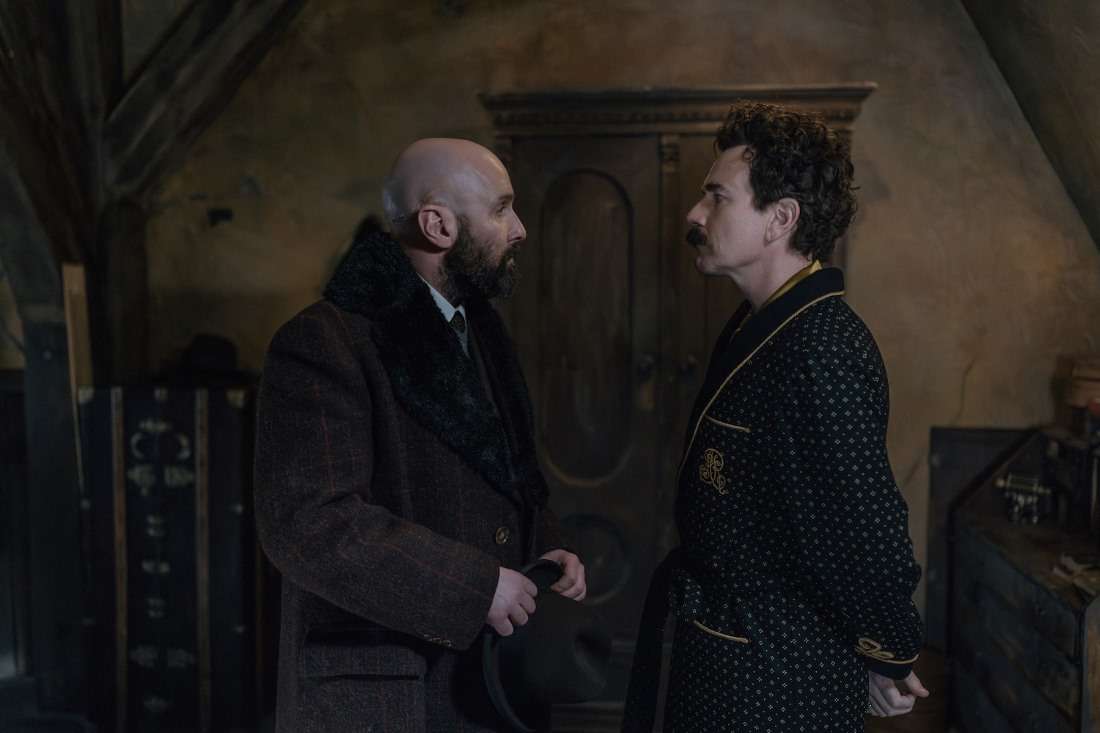A Gentleman in Moscow Episode 1 Recap & Ending Explained: “A Gentleman in Moscow” is a limited Showtime series based on Amor Towles’ acclaimed 2016 novel of the same name. Screenwriter Ben Vanstone, who turned the novel into a teleplay, serves as the writer and showrunner. Starring Ewan McGregor in the lead role, the narrative revolves around a fictional Count Alexander Ilyich Rostov, who returns home from Paris after the 1917 Bolshevik Revolution only to be sentenced to an indefinite house arrest at the luxurious Metropol Hotel in central Moscow. Though the Count is spared from death, the exhaustingly circumscribed living poses a greater challenge for him. He is banished to an attic room in the hotel and becomes a first-hand observer of the changing tides of 20th-century Russian history. The resilient Count tries to retain his dignity and cling to hope, even though it’s not an easy task.
Amor Towles’ “A Gentleman in Moscow” provides a limited yet distinct perception of post-Revolution Russia. Moreover, the author’s rich prose, characterizations, and philosophical insights take us on a poignant, life-affirming journey. The episode one of “A Gentleman in Moscow,” titled “A Master of Circumstance,” directed by Sam Miller, gracefully visualizes the erudite and charming words of Mr. Towles. The first episode offers a solid start to this gripping emotional drama, further bolstered by an effortlessly brilliant Ewan McGregor performance. Now, let’s take a look at the events that unfold in “A Gentleman in Moscow” episode 1. Spoilers Ahead.
A Gentleman in Moscow Episode 1 ‘A Master of Circumstance’ Recap:
The Fall of the Russian Noble Class
After the October 1917 Revolution and the rise of the Bolsheviks, the Russian aristocratic families saw their lives turned upside down. Nobility was formally abolished. While the majority of high-ranking noble families left Russia (White Emigres), the rest were killed in the purges or were subjected to discrimination. Our protagonist in “A Gentleman in Moscow” is one such unfortunate aristocrat caught in between the turbulent chapter of history. When we first see the mustachioed Count Alexander Ilyich Rostov (McGregor), he looks anxious. Nearby, a couple of Bolshevik soldiers drag a man in the corridors. He vanishes from the Count’s view, but soon gunshots are heard outside.
The soldiers come for the Count, too. But he is taken to a Bolshevik Tribunal. It is 1921, and Moscow is covered with snow. The Count has been staying at his suite in the Metropol hotel for four years, ever since his house was burned down in the aftermath of the Revolution. The tribunal members question why he came back to Russia despite knowing how the noble class would be treated after the Revolution. The Count jibes that he missed the climate. One might wonder why this aristocrat was allowed to sit in front of a tribunal instead of being ‘put against the wall’ like other members of the noble class.
Why Count Alexander Rostov isn’t Sentenced to Death?
The reason is the Count’s 1913 poem: “Where’s Our Purpose Now?” Some senior-ranked Bolshevik Party members believe this poem is a call for revolutionary action. Hence, the Count is asked to return to the hotel and stay there for the rest of his life. The tribunal also makes it clear that the Count will be shot if he sets foot outside the Metropol. A couple of soldiers accompany the Count back to the hotel. In his suite, The Count encounters Osip (Johnny Harris), an officer of the secret police. The man takes the Count to show him his new quarters. It’s a small, weather-beaten space in the attic that’s a far cry from the comforts of the suite. It were used as rooms for the hotel servants. The Count is allowed to take a few of his personal possessions to his new room.
Interestingly, the Count accepts his changed circumstances and feels glad that the attic room at least has a bed and a window. Osip says food and board will be provided and emphasizes that he must always stay inside the hotel. Then, the first day of the Count’s ‘imprisonment’ begins. In the attic room, he has added a table and a burner to heat tea and keep himself warm. The Count wears his suit and bowtie and goes to the restaurant for dinner. He tries to keep up the appearances as a butler says to the chef (both very familiar to the Count), “I believe he’s refusing to be beaten.”
Who is Nikolai?
The chef appreciates the Count’s sense of taste; the barber still addresses him as “Your Excellency” and gives him the royal treatment. The Count keeps up his routine, as we observe in a montage. Soon, it is Day 47. In the hotel lobby, the Count is greeted by a girl. Then, he comes across his friend, Prince Nikolai (Paul Ready), who insists he is now just ‘Nikolai.’ He loves music and is now playing the violin at dinner parties. Nikolai’s mother and sister have emigrated to Switzerland. He looks jittery, but the Count asks Nikolai to have a drink with him after dinner. The Count also emphasizes that ‘they’ might take our properties, but ‘they can’t take away who you are.’
At the bar, Nikolai wonders why they are still in the country that doesn’t want them. To answer him, the Count narrates an incident from his childhood involving a boy from the neighboring estate who beat him at a game of draughts. Consequently, the little Count was harboring hurtful feelings, which his grandmother understood. But she also asked the boy, “Why give him the satisfaction?” But before this answer sinks in, Nikolai says even that boy from the Count’s neighboring estate is killed and the house burned.
And such widespread crackdown on the noble class will persist for years or decades. Therefore, Nikolai wants to escape the country and hopes the Count can accompany him. But the Count doesn’t want to lose or change his identity and not leave his country. He even jokingly scoffs at the idea of shaving the mustache to execute the escape plan. The Count says a sense of humor keeps him going, and if he takes all this too seriously, then only despair awaits him.
The Count Meets Nina
The following morning, the Count visits the barber as usual. A man waiting for service opposes the barber serving the Count first. He angrily clips a piece of the Count’s mustache before storming out. At the restaurant, the butler treats him in a mildly rude manner. Thankfully, at the dining table, a nine-year-old girl named Nina (Alexa Goodall) – who previously greeted the Count – strikes up a conversation with the Count. The precocious kid is obsessed with Royalty and questions him about the life of princesses.
Nina also asks about his knowledge of duels. The Count hesitantly says he doesn’t know much, but his godfather has been a ‘second’ several times. The ‘seconds’ are individuals who set up a duel’s rules of engagement. The Count also goes on to talk about a duel whose origin was a dispute that happened in the hotel’s lobby. At those times, the hotel was under a different manager, who the Count reveals had a pair of antique pistols in his office behind a painting. Once the challenge is accepted, the parties and weapons are taken to an agreed place in the hours before dawn. The Count ends his recollection by saying the reality of duels, however, was not quite as romantic as it sounds.

Why does Count Alexander Consider Escaping from the Hotel?
When Nina leaves, the disapproving butler asks the Count to meet the manager after finishing his meal. The manager tells the Count he should avoid honorifics like ‘Your Excellency’ or ‘Count.’ He should be simply called Alexander and also encourage the people he knows to do so. The manager also warns Alexander that there’s a reason why the Bolshevik Party has allowed the Metropol to operate and serve its clientele despite the drastically changed social and political circumstances. It is to constantly monitor them and find those who are even slightly disloyal to the Party or the ideology. Just as the manager says, “The hotel is a dangerous place, especially for you,” he is interrupted by a staff and seeks a private conversation with the manager.
When the manager leaves, Alexander checks behind a painting and finds the antique pistols. Later, the secret police officer brings soldiers to check Alexander’s quarters rigorously. Standing before the revolving doors, Alexander now truly considers escaping the hotel and the country. As the manager has cautioned, it will only worsen for people like him. He meets Nikolai and learns his plan to escape. There’s such joy in their faces in the imagined visuals of their escape, although Alexander understands the inherent dangers. Before leaving, Nikolai tells Alexander that they can’t take any personal belongings with them.
Nina Reveals the Hidden World within Metropol
On day 65, Alexander comes across Nina Kulikova in the lobby. This is also the first time he learns her name. Subsequently, Nina takes him on a tour through the hotel. The kid tells him that she has the hotel’s master key, which allows her to go on little adventures to evade the boredom. Though Metropol is a familiar place for a former aristocrat like Alexander, Nina shows him a hidden world within the hotel. She takes him to fireplaces, deep down in the hotel, where he can burn the ‘illicit love letters.’ He looks through spy holes for the ballroom. They observe a maid who serves her kid the leftovers. Books and materials are stored at a place, among which Alexander finds his godfather’s favorite chair.
Count Alexander Rostov has grown up among many possessions and fewer people that each material evokes a memory in him. An antique clock, a chess set, a vintage wine bottle, or a chair – these materials are part of Alexander’s life. The rapidly changing Russian society calls for discarding the old ideologies or beliefs alongside its materials. So, in a way, for Alexander, the absence of these materials means losing a chunk of his identity and memory. However, for little Nina, “they are just things.” During this tour, Alexander comes across an open door at one moment. But curbing his temptation, he follows Nina to a corridor full of government files, among which he finds a list of condemned men, including Nikolai. Alexander learns that the secret police add names of surviving noble class members and then ‘find crimes.’
A Gentleman in Moscow Episode 1 ‘A Master of Circumstances’ Ending Explained:
What Happens to Nikolai?
On Day 67, when Nikolai arrives at the hotel with his troupe, Alexander takes him aside and asks him to leave immediately. He warns that Nikolai doesn’t have weeks to execute the escape plan—it could be days or even hours. Moreover, Alexander doesn’t want to escape from Metropol for some reason. Nevertheless, Nikolai shows the travel documents he got for both of them. The disapproving butler observes this exchange between Nikolai and Alexander.
Nikolai says he will now go and play Rachmaninoff on Russian soil one last time. As Nikolai prepares to perform, Alexander tells Nina that Nikolai is a real prince. Though his father was a general, Nikolai disliked fighting and only loved music. But just as Nikolai starts playing the violin, the soldiers interrupt and take him away. Alexander and Nina can only watch in shock. Nikolai is taken outside to the snow-filled pavement and shot dead. Alexander stands frozen in the lobby. Having set an example, the secret police officer intimidates Alexander a little more before leaving. The episode 1 of “A Gentleman in Moscow” ends with Alexander, who refuses to lose himself to despair, looking absolutely grief-stricken.
The Fragmented Memories of Count Alexander
Throughout “A Gentleman in Moscow” episode 1, we witness fragments of Alexander’s sun-drenched memories from the past. We learn that the Count has lost his parents at a very young age. He and his sister, Helena, were brought up by his grandmother. While we know Alexander returned from Paris to facilitate the safe passage of his beloved grandmother, we don’t know what really happened to Helena. Furthermore, when Alexander talks of the duel, he remembers an occasion that certainly has a deep personal connection to him. These reflections from the past will be provided with more context in the subsequent episodes. It will offer us a more enriching portrait of our charming and complex protagonist.
Eventually, there’s also the question of the narrator. When the Count leaves the tribunal, a woman’s voice-over starts narrating the story. By the end of episode 1, the woman’s voice says Alexander’s fate is closely intertwined with hers. If you have read the novel, you’d already know the woman’s identity behind the voice and her deep bond with Count Alexander Rostov over the years.




![The Eternal Breasts [1955] Review – A Portrayal of Female Desires and Creativity that’s Daring for its Time](https://79468c92.delivery.rocketcdn.me/wp-content/uploads/2020/09/The-Eternal-Breasts-1955-768x409.jpg)



